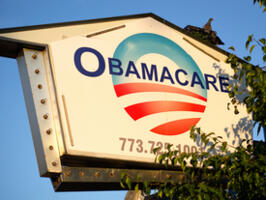Support Grows for Government-Run Health Care, Universal Basic Income
As the coronavirus opens the door for greater government control of our lives, voter support for a taxpayer-funded income for all and government-controlled health care are on the rise. Democrats are far bigger fans than others, though.
A new Rasmussen Reports national telephone and online survey finds that 40% of all Likely U.S. Voters now favor having the federal government provide every single American with a basic income. Slightly more (43%) are opposed to a so-called “universal basic income,” while 17% are undecided. (To see survey question wording, click here.)
The last time Rasmussen Reports asked this question - in August 2011, just 11% favored a basic income grant for all; 82% were opposed.
Forty-five percent (45%) of voters now favor a single-payer health care system where the federal government provides coverage for everyone. Forty-one percent (41%) are opposed. Fourteen percent (14%) are not sure.
Support for a single-payer system peaked at 48% in September 2017 after running in the 30s for several years prior to that. But that support had fallen to 36% by August of last year because more voters predicted the quality of care would go down while costs went up.
(Want a free daily e-mail update? If it's in the news, it's in our polls). Rasmussen Reports updates are also available on Twitter or Facebook.
The survey of 1,000 Likely Voters was conducted March 29-30, 2020 by Rasmussen Reports. The margin of sampling error is +/- 3 percentage points with a 95% level of confidence. Field work for all Rasmussen Reports surveys is conducted by Pulse Opinion Research, LLC. See methodology.
Voters question how long the United States can remain locked down because of the coronavirus, and most share President Trump’s worry that the government may go too far in its efforts to defeat the disease.
Fifty-seven percent (57%) of Democrats support a government-funded basic income for every single American, a view shared by just 26% of Republicans and 33% of voters not affiliated with either major party.
Similarly, 64% of Democrats favor a single-payer health care system where the government provides coverage for everyone. Only 27% of GOP voters and 41% of unaffiliateds agree.
The majority of those under 40 favor both ideas. Most older voters do not.
Whites are much less likely than blacks and other minority voters to support a universal basic income and a single-payer health care system.
Seventy-seven percent (77%) of those who support a universal basic income also favor a single-payer health care system. Among those who oppose a government-funded paycheck for all, 72% oppose a single-payer system as well.
Voters are fine with the $2.2 trillion relief package passed by Congress in response to the coronavirus, even though they suspect it’s packed with goodies for political allies. They also think more taxpayer-funded help will be needed in the days ahead.
Before the coronavirus exploded in America, most voters in surveys for years have called for smaller, cheaper government, perhaps in large part because they don’t trust the feds with their money. Most also felt there are too many Americans already dependent on the government for financial aid.
Additional information from this survey and a full demographic breakdown are available to Platinum Members only.
Please sign up for the Rasmussen Reports daily e-mail update (it's free) or follow us on Facebook. Let us keep you up to date with the latest public opinion news.
The survey of 1,000 Likely Voters was conducted March 29-30, 2020 by Rasmussen Reports. The margin of sampling error is +/- 3 percentage points with a 95% level of confidence. Field work for all Rasmussen Reports surveys is conducted by Pulse Opinion Research, LLC. See methodology.
Rasmussen Reports is a media company specializing in the collection, publication and distribution of public opinion information.
We conduct public opinion polls on a variety of topics to inform our audience on events in the news and other topics of interest. To ensure editorial control and independence, we pay for the polls ourselves and generate revenue through the sale of subscriptions, sponsorships, and advertising. Nightly polling on politics, business and lifestyle topics provides the content to update the Rasmussen Reports web site many times each day. If it's in the news, it's in our polls. Additionally, the data drives a daily update newsletter and various media outlets across the country.
Some information, including the Rasmussen Reports daily Presidential Tracking Poll and commentaries are available for free to the general public. Subscriptions are available for $4.95 a month or 34.95 a year that provide subscribers with exclusive access to more than 20 stories per week on upcoming elections, consumer confidence, and issues that affect us all. For those who are really into the numbers, Platinum Members can review demographic crosstabs and a full history of our data.
To learn more about our methodology, click here.





